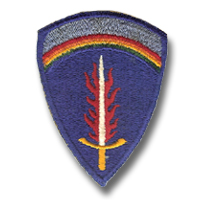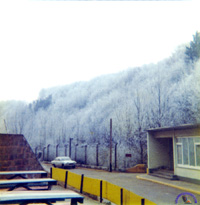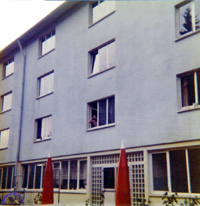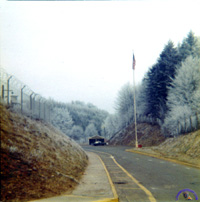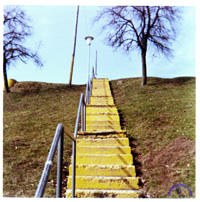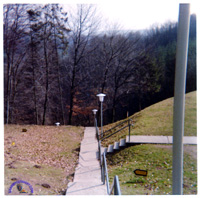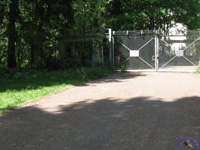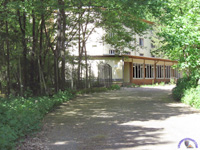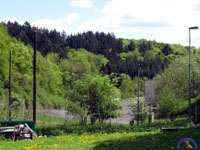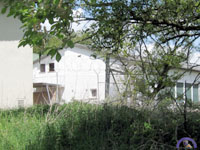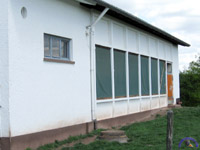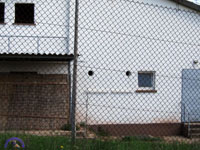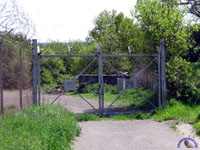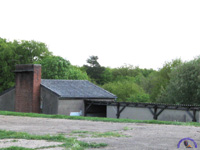| If you do
NOT see the Table of Contents frame to the left of this page, then
Click here to open 'USArmyGermany' frameset |
|||||||||||||||||||||||||||||||||||||||||||||||||||||||||||
|
709th Military Police Battalion |
|||||||||||||||||||||||||||||||||||||||||||||||||||||||||||
|
|
|||||||||||||||||||||||||||||||||||||||||||||||||||||||||||
|
|||||||||||||||||||||||||||||||||||||||||||||||||||||||||||
|
|
|||||||||||||||||||||||||||||||||||||||||||||||||||||||||||
| Battalion History | |||||||||||||||||||||||||||||||||||||||||||||||||||||||||||
| 1945 - 1989 | |||||||||||||||||||||||||||||||||||||||||||||||||||||||||||
| (Source: History of the 709th Military Police Battalion, 1976; History of the 709th Military Police Battalion, late 1980s. 709th MP Bn, APO 09757) | |||||||||||||||||||||||||||||||||||||||||||||||||||||||||||
 709th Military Police Battalion DI
709th Military Police Battalion DIThe 709th Military Police Service Battalion thus officially entered Paris on 29 August 1944, four days after its liberation, and assumed the immediate mission of installation security. (Snipers were still active and skirmishes with them are recorded.) Very shortly, regular foot and motor patrols made their appearance to enforce discipline, law and order. The 709th was the only military police unit at that time in the huge city and it operated the Paris Detention Barracks for its first year, plus providing traffic escort for supply movements through the city's myriad byways. During this period Company D was dispatched for duty in Orleans for approximately two months. In October 1945, the battalion departed Paris and proceeded to Frankfurt, Germany, then Supreme Headquarters for the Allied Expeditionary Forces (SHAEF) commanded by General of the Army Dwight D. Eisenhower. Normal military police duties were quickly assumed in the devastated and dangerous city and skirmishes between members of the battalion and other US troops were not uncommon, attesting to the state of affairs. The battalion continued its discipline, law and order mission in the months following World War II. Among its many missions was a five months mission in late 1946 which tasked the battalion to provide security of the Litchfield War Crimes Trial at Bad Nauheim. Also in 1946, the battalion had the distinction of providing special escorts and honor guards in September to visiting General Eisenhower and his wife.
During the last half of 1948 and well into 1949, the battalion provided personnel and equipment for the police support of the Berlin Airlift. Also during 1949, the 709th provided honor guards and escorts for various visiting dignitaries. Among the visitors were Governor Thomas E. Dewey of New York, who was touring Europe as an European Recovery Plan observer; General Omar Bradley; General Vanderberg, Air Force Chief of Staff; and Admiral Louis F. Denfield, Chief of Naval Operations. As an added Hollywood attraction, Dorothy Lamour climaxed the stream of visitors by her goodwill tour. In December of 1949, the battalion continued its security role by providing a detachment for security of the person and family of the Honorable John McCloy, US High Commissioner of Germany in Bad Homburg. Other detachments of the battalion were further assigned the tasks of securing the High Commissioner's office buildings in Frankfurt, as well as his headquarters in Bonn. Normal commitments continued throughout 1950 and included an honor guard for the Secretary of Defense, the Honorable Louis Johnson. In September 1951, the battalion was once again redesignated, this time to its present title, the 709th Military Police Battalion. The 11th anniversary of the Military Police Corps was celebrated by the battalion conducting the largest parade since World War II on September 26, 1952. March winds of 1953 brought a new mission to the 709th that required complex reorganization. The battalion assumed responsibility of Military Police service support in central West Germany. Companies B, C, and D were deployed throughout the newly created Northern Area Command (see also "A Brief History of the Area Commands in Germany"). Headquarters, Company A and elements of Company C remained in Frankfurt. Company B established its headquarters in Bamberg, with detachments in Fulda, Bad Kissingen, Schweinfurt and Wildflecken. Company C was headquartered at Hanau, with detachments at Darmstadt and Aschaffenburg, while Company D had its headquarters at Giessen, with detachments at Bad Nauheim and Kassel. The overall area was in excess of 20,000 square miles, and as much as 160 miles separated the units. During the period June 1953 until September 1954, the 709th dispatched a security platoon to EUCOM Headquarters at Camp DeLoges, France. The 536th Military Police Company was attached in 1954 to provide Military Police support in Würzburg, Kitzingen, Bamberg and Wertheim. Early in 1956, an additional responsibility came to the 709th, to police Amsterdam, Holland every May through December and to apprehend US military offenders from the Scandinavian countries plus escort them to Central Germany. Operation "Big Switch," November 1957 to January 1958, in which the 2nd Armored and 8th Infantry Division exchanged USAREUR locations required police support from the 709th. A month later, Operation "Sabre Hawk," tested the new Pentomic concept which also involved elements of the battalion. In the summer of 1958, the Mid East Lebanon Crisis required the 709th to provide personnel to perform emergency Police operations in that area, in which the battalion earned a letter of commendation for its efficient efforts. A solemn commitment was given to the battalion the year of 1958 as the remains of thirteen unidentified soldiers of World War II were chosen from cemeteries throughout Europe and Africa and were escorted from Frankfurt to France by members of the battalion, where the final selection was made for the Unknown Soldier of World War II. (See the Tomb of the Unknowns) A lighter note occurred to the 709th in the form of an official invitation from the Belgium 4th Military Police Company for members of the battalion to attend a Friendship Ceremony at Brussels. A framed certificate at Battalion Headquarters commemorates the event. (The Belgium 4th Military Police Company had at one time jointly patrolled Frankfurt with the 709th.) The disbanding of Military Police Highway Patrol Companies in USAREUR brought another requirement to the battalion of patrolling the major roadways of Central West Germany. (See the 62nd Military Company (Highway Patrol) Association website) On 17 October 1962, surprise visitors inspected Battalion Headquarters with only several hours prior notice. The Secretary of the Army and his staff afterwards expressed great satisfaction of their observations. John F. Kennedy, the Thirty-Fifth President of the United States, was furnished additional security by the 709th while in transit and during his 1963 European tour. The Battalion Headquarters vacated Gutleut Kaserne, Frankfurt, in June of 1964 and displaced to Funari Barracks, Mannheim, in anticipation of reorganization under the COSTAR concept and the activation of the 2nd Military Police Group. TOE 19-35 became effective and caused the fourth company, Delta, to be discontinued, while the remaining three reorganized as follows:
On 16 June 1965, in front of the I.G. Farben Building in Frankfurt, all of the US Army Area Command military police units participated in ceremonies activating the very first Military Police brigade. 2nd Military Police Group then relocated to Nürnberg, while the newly formed 15th Military Police Brigade established its headquarters in Frankfurt. One month thereafter, the 709th departed Mannheim, temporarily resided in the familiar Gutleut Kaserne, Frankfurt, and then began residency in its own kaserne in Offenbach, soon named Bieberer Strasse Kaserne. The 15th Military Police Brigade was then shortly (thereafter) transferred on 10 January 1966 from (US Army) Area Command to Seventh Army, causing yet another reorganization. The 709th was affected to the extent of losing all assigned numbered companies, plus Company C, (with) another Company C being formed in Hanau from the resources of the 385th Military Police Battalion. In recognition of its combat mission preparedness, which was concurrent with its peacetime training mission, the 709th underwent an intensive period of field training during the period from December 1965 to March 1967. Each platoon went independently to the field for two weeks. A large number of company-sized training tests were conducted. To enhance combat training, military police support was rendered to the six separate training exercises. The Vietnamese Conflict made itself felt in Europe in the spring of 1966 by means of a drawdown of selected personnel, including many Officers, NCOs and other enlisted men of the 709th. In the fall the Clay-Mildenberger world heavyweight boxing championship was held in Frankfurt and the 709th provided a large share of the police support. In 1967, the 709th provided security for a convoy that roadmarched to the East German border in order to return a Soviet MIG-17 aircraft whose pilot had defected. Also in 1967, the Middle East Crisis erupted and the 709th was tasked to dispatch a company of MPs into the area to insure the safety of United States civilians. Company A was airlifted within six hours of their notification to a staging area in Athens, Greece. The cessation of hostilities in the Middle East brought Company A of the 709th Military Police Battalion back to Germany to resume their routine mission. In 1968, the Soviet Union invaded Czechoslovakia. In protest against the invasion, the people of West Germany broke into the Soviet Military Liaison Compound in Frankfurt. Since the protection of the building, material and persons inside the compound came under the jurisdiction of the United States Forces, the troops of the 709th MPs were selected to repel the German citizenry. This operation was done successfully without injury to persons or material within the compound. Beginning in November 1968 and lasting until February 1969, the 709th supported the NATO Training Exercise REFORGER I. This complex exercise was designed to test the speed and effectiveness of massive troop shipments from the United States to continental Europe. Once these troops landed they were moved to sites of pre-positioned equipment and then to their respective combat sectors. In their assigned areas it was the job of the 709th Military Police Battalion to insure that movements of all REFORGER units was accomplished with speed and safety on the highways of Germany. The 709th was commended on its successful completion of this mission. In January 1969, USAREUR announced that the Guardian, the Battalion newspaper, had won the Distinguished Journalism Award for the third straight year. In February, the Department of the Army announced that the Guardian had won an Army-wide Distinguished Journalism Award in the mimeograph class of newspapers. In the previous year, 1968 and again in 1969, the Guardian won the Thomas Jefferson Award for the best mimeograph paper of the Department of Defense. In this competition the Guardian competed with other award winning mimeograph papers with all the services. On 22 May 1969, members of the 709th Military Police Battalion were honored by their German counterparts, the 740th Feldjäger Battalion. The awards were presented by LTC Solies, Commander of the 740th Feldjäger Battalion. The awards were won as part of Project Partnership which is designed to increase understanding among US and Allied military personnel in support of NATO and their defense of Western Europe. In June of 1969 two new units were added to the 709th Military Police Battalion. The first of these units was the 570th Military Police Platoon (Railway Guards). The Headquarters of the 570th MP Platoon is located at Gutleut Kaserne in Frankfurt. The main mission of this platoon is to handle all railway security operations in Western Europe. This mission includes: safeguarding United States Mail; safeguarding sensitive and classified consignments; investigating pilferage of official consignments incurred during transit; and the maintenance of law and order on designated military and civilian trains. The 570th is the only Railway Guard unit in the United States Armed Forces. The 59th Military Police Company was assigned to the 709th Military Police Battalion in June of 1969. This unit's history extends from the North African and Italian Campaigns of WWII and the Korean Conflict. During the Korean Campaign, the 59th MPs received the Meritorious Unit Award and the Presidential Unit Citation. Immediately following the Korean Conflict the 59th was deactivated but was reactivated in 1957 and sent to Bremerhaven, FRG. In Bremerhaven the 59th furnished port security and pulled routine MP duty. During the month of June 1969, elements of the 709th participated in a 15th Military Police Brigade Traffic and Communications Exercise with a rating of satisfactory upon completion. Also in the month of August 1969, units of the 709th underwent an operational readiness test/field training exercise, ARTIC II. The exercise was graded and supervised by an umpire assigned by the 15th Military Police Brigade, with an overall rating of Combat Ready. During the latter part of the month of August 1969, all companies received their AGI inspection and passed with a satisfactory rating. In the month of December 1969, protests were directed against the United States by German citizens in Frankfurt. In certain of these demonstrations, the 709th Military Police Battalion was utilized as a back-up force in the event that the German Polizei were unable to protect persons and property belonging to the United States. The 709th Military Police Battalion, being aware of the German citizen's protest directed against the United States, became active in 1970 to improve German-American relations. The Battalion sponsored an Open House so that the German community might see the Kaserne and witness the Military Police at work. They also took part in the German International Drivers Rodeo and the International Lighting Week. On 29 April 1971, the 59th MP Company was deactivated per General Order #255, HQ, USAREUR and Seventh Army. Unit colors and twenty-five athletic trophies were retired to storage at the US Army Historical Facility. The unit's mission was turned over to the 3rd Platoon of Company A, 709th Military Police Battalion, Bremerhaven, Germany. Also at this time, the function of the 510th MP Detachment/Area Provost Marshal, North Germany, located at Bremerhaven was reassigned from the 510th MP Detachment to the 61st MP Detachment/Area Provost Marshal, Taunus Area, headquartered in Frankfurt am Main Germany, located at the intersection of Hansaallee and Miguelallee (near the Frankfurt MP Station). The 61st MP Detachment also had detachments operating MP Stations located in Frankfurt, Darmstadt, Giessen, Butzbach, Bad Hersfeld and Fulda. In the period 8 August 1971 through 15 October 1971, the battalion supported Operation FLINTLOCK IV, a classified mission. During the period 20-23 September 1971, the 709th Military Police Battalion hosted the annual 15th Military Police Brigade Griffin Shoot. The match was held at the Darmstadt NATO Range. Company B placed with the 2nd best team, while Company C placed with the 2nd best individual. During the period 27 September 1971 through 16 November 1971, the 709th Military Police Battalion provided 93 men to the operations of REFORGER III. Duties ranged from convoy control, security forces duty, and MP patrol to Traffic Accident Investigation and TCPs. On 18 October 1971, the 570th MP Platoon was relieved from assignment to the 709th MP Battalion and reassigned directly to HQ, 15th Military Police Brigade. However, the platoon was then attached to the 709th for administrative and logistical support. During the period 26 October 1971 through 27 October 1971, this Battalion supported Operation GUARDRAIL, a classified mission. Also in 1971, Company A won the Hessen Support District Softball Championship. A realignment of the battalion took place in 1971 which placed elements of the battalion in major troop concentration points so that they could better support their law enforcement mission in their area of operations. At the same time, troops strengths were raised to meet the mission requirements. Operation Partnership was expanded during January 1972 by the 709th Military Police Battalion to include German Polizei. The movement greatly increased the effectiveness of both German Polizei and Military Police operations of traffic control and traffic accident investigation. The combined police operations consisted of roadside safety checks and payday partnership patrols. The united effort of traffic control immediately reduced the number of violations and traffic accidents within Northern Germany by both Americans and Germans. Also during the same time, the 709th Military Police Battalion initiated 95B Orientation training to increase the professionalism of their military police patrolmen. 29 January through 4 February 1972 saw the battalion in support of Operation WILEY RUN. Acting in conjunction with the 570th MP Platoon (Railway Guard), the battalion provided a full platoon for a reaction force while sensitive/classified type munitions were transported by rail. In May of 1972, the battalion became actively engaged in security and police activities during the reign of Bader-Meinhof terror. Personnel and equipment of the 709th assisted in security of V Corps Headquarters after the bombing of the Officers Open Mess located at the Terrace Club in Frankfurt. Throughout the spring, the 709th secured government installations and assisted German Police in the control and prevention of terrorist activities. Culminating in the summer and fall of 1972, the Bader-Meinhof terror spread to various anti-US riots and demonstrations. The battalion continued to provide security and was placed on continuous full alert during the majority of the reign of terror and violence. On 12 June 1972, LTC Richard A. Mosco succeeded LTC Richard D. Miller as Commander of the 709th Military Police Battalion at Bieberer Strasse Kaserne, Offenbach, Germany. The 709th Military Police Battalion, in its ever increasing drive to upgrade the professionalism of their Military Police, began a period of intense training of its personnel toward understanding of Human Relations in July 1972. This training equipped the Military Policemen with the knowledge to cope with the public he meets daily in his duties. The training also served as a link of understanding among the members of the battalion. On 23 August 1972, the 570th MP Platoon (Railway Guard) was nominated by the 709th for the BG Jeramiah P. Holland Award for best military police unit in the United States Army. Also during August and running into mid September of 1972, the 709th had the privilege of providing one officer and thirty military policemen in support of the 1972 Summer Olympic Games in Munich. Commitments included patrolling, VIP security and escort and standby reaction forces. October of 1972 was an eventful month for the 709th in that not only did the 570th MP Platoon (Railway Guard) receive the Jeramiah P. Holland Award (presented on 6 October by Lt Gen C. W. Eifler, CG of TASCOM to 2LT John Young, Platoon Commander), but the battalion Headquarters and Company A moved from Bieberer Strasse Kaserne, Offenbach, to Gutleut Kaserne, Frankfurt, on 12 October 1972. Continuing its mission also during October, the battalion provided a security squad for VIP security in Munich and Garmisch and provided additional VIP security personnel for two weeks in support of Operation EPSILON. On 1 January 1973, the Battalion Commander of the 709th Military Police Battalion assumed duties in a dual-role concept: Commander, 709th Military Police Battalion and Provost Marshal, Northern Region. At this time the area Provost Marshals of the Taunus and Vogelsberg areas within the Northern Region of Germany came under the Battalion Commander's operational control. This concept of operation provided more supervision of law enforcement activities and support in the Northern Region. The Northern Region's area of response is 60,000 square miles and includes nine major locations where US Forces are concentrated. Headquarters, 15th Military Police Brigade, LOI #1-73, authorized additional staffing to the Battalion Commander as police operational personnel. Positions authorized at the time were:
At this time there was a realignment of police support within the 15th Military Police Brigade. The 709th Military Police Battalion, headquartered at Frankfurt, Germany, was designated to provide law enforcement services to the Northern Region of the Federal Republic of Germany. Covering an area of responsibility of approximately 11,500 square miles, the Northern Region is sub-divided into two areas, each with its own Area Provost Marshal and Military Police Detachment. The 61st Military Police Detachment serves the Taunus Area and the 67th Military Police Detachment serves the Vogelsberg Area. The nine MP Stations within these two areas are located in Frankfurt, Giessen, Fulda, Bad Hersfeld, Bremerhaven, Hanau, Gelnhausen, Butzbach, and Darmstadt. Each company of the battalion, Company A headquartered in Frankfurt, Company B headquartered at Giessen, Company C at Hanau, and the 564th MP Company headquartered at Butzbach, support one or both of the two Area Provost Marshals. Located at Bremerhaven is one platoon of Company B which is engaged in law enforcement and security for sensitive cargo at the Bremerhaven and Nordenham ports. Additionally, attached for support to the 709th MP Battalion is the 570th MP Platoon (Railway Guard) which is headquartered at Gutleut Kaserne. February of 1973 involved the battalion in support of REFORGER IV. The traffic control and convoy escort mission committed up to seventy-five military policemen and officers at any one time. In March 1973, GO #45, Headquarters, 15th Military Police Brigade assigned the 564th Military Police Company to the 709th Military Police Battalion. The 564th MP Company assumed law enforcement duties at Butzbach and Darmstadt with two squads attached to Company A, Frankfurt, for port security mission in Bremerhaven. On 3 March 1973, the 564th MP Company and HHD, 709th MP Battalion participated in Operation GOLDEN ARROW for a period of two weeks and also provided personnel for a classified mission, "CENTAG." On 20 August 1973, Company A's softball team won the first place trophy for finishing as top team in the Frankfurt Western Division fast pitch league and on 4 September 1973 finished second in the overall Frankfurt fast pitch league. On 28 August 1973, there was a battalion organization day which consisted of all units in the battalion participating. There were five events: best vehicle, tire changing, alert gear, bed making, and technical inspection of a ¼-ton jeep. On 28 September 1973, Company C along with the 67th MP Detachment participated in an open house to celebrate the anniversary of the Military Police Corps. During this period, Company C formed a basketball team that took third place in the Hanau Invitational Basketball Tournament. In October 1973, the 709th MP Battalion was tasked to provide over 100 military police personnel and equipment to secure the numerous railway and road movements of Operation 9DD (a classified mission). Throughout the remainder of 1973 and into the early months of 1974, military policemen were almost continually used in a security role from Frankfurt to Bremerhaven. Also in October, the battalion was given the responsibility to provide security for the transport of HAWK missile components from Mannheim to Bremerhaven. During 1973 and 1974, all HAWK road movements were handled in an expeditious manner. The battalion received an overall rating of satisfactory on the Annual General Inspection during 1973. This rating was for both unit and law enforcement functions. Elements of the battalion provided military police support for REFORGER V from September through 16 November 1973. Other special missions and/or operations which transpired during 1973 are as follows:
On 24 February 1974, personnel from the 709th Military Police Battalion were utilized as VIP security for the Army Chief of Staff, General Creighton Abrams, Military Police Investigators in conjunction with uniformed Military Policemen composed all assets used for his security. The Gelnhausen Military Police Station was used as the Operations Center and focal point for all planning, placing and supervising during the security operations. On 8 March 1974, the battalion graduated its fourth German Language Course, which was presented by an instructor from the Frankfurt Education Center. Ten members of the battalion successfully completed the six week course and were presented Department of the Army Certificates by LTC Mosco, Battalion Commander. On 22 April 1974, the 50th MP Detachment (Confinement) was officially deactivated and removed from attachment to the 709th Military Police Battalion. On 23 April 1974, the battalion received its first military police female officer. 2LT Lieutenant Ellen Flaminio was welcomed into the battalion and subsequently assigned to Company A as a platoon leader. On 7 June 1974, LTC Richard A. Mosco relinquished the command of the 709th MP Battalion to LTC Ted S. Chesney at Gutleut Kaserne, Frankfurt, FRG. On 1 July 1974, a major change in command took place as the 709th MP Battalion was reassigned to V Corps from 15th MP Brigade. The battalion changed the shoulder insignia from the 15th MP Brigade "Griffin" to the V Corps blue and white pentagonal shaped patch. The battalion became a major subordinate command of V Corps. The change was made as a result of Project CHASE which realigned USAREUR MP assets to Area Commanders. The period was characterized by purposeful turbulence involving the redesignation of many subordinate elements to align them with new areas of responsibility. The assumption of control over other elements added to the battalion's force structure and the education of the V Corps Staff on the functions, capabilities and requirements of their newest major subordinate command. The 60th MP Detachment located at Baumholder was reassigned to the 709th MP Battalion (C) and Co A, 94th MP Battalion was attached to the 709th MP Battalion. The addition of these units increased the battalion's size to cover 12 locations over 31,000 square miles. The 60th MP Detachment became responsible for MP Stations at Baumholder, Mainz, Prüm and Bad Kreuznach. The 61st MP Detachment took responsibility for stations at Frankfurt, Darmstadt, Bad Hersfeld and Fulda and the 67th MP Detachment took over Hanau, Gelnhausen, Butzbach and Giessen. The 60th MP Detachment was then attached to the 8th Infantry Division on a trial basis, and the 67th MP Det to the 3rd Armored Division. Because of later difficulties in administration and logistical support, the attachment was terminated and the units were placed on an OPCON (operational control) basis to their respective divisions, with administrative and logistical support remaining with the battalion. Discovery of severe funding and personnel shortages by the V Corps Staff resulted in immediate funds, sufficient for all needs, being made available. Also evident was a rapid increase in personnel to help bring the battalion to normal strength. The helpfulness of the V Corps Staff in integration of the 709th MP Bn made the period a significant, if hectic, one in the battalion's history. During this period several units were redesignated within the battalion. The 2nd Platoon (-), 564th MP Co was redesignated as the 1st Platoon, Co B, 709th MP Bn located at Frankfurt. 1st Platoon, Co B, 709th MP Bn at Giessen was redesignated 2nd Platoon, 564th MP Company. 1st Platoon, Co C, 94th MP Battalion was redesignated 3rd Platoon, 564th MP Co at Camp Pieri, Wiesbaden. HQ, Co B, 709th MP Bn relocated from Giessen to Frankfurt, FRG. The 3rd Platoon, 564th MP Co at Darmstadt was redesignated as 2nd Platoon, Co B, 709th MP Bn. As a result of Project CHASE the 709th MP Bn (C) formulated and published the new General Defense Plan (GDP-1-75) to support V Corps. The 61st MP Detachment was relocated to Henry-Budge Strasse in June 1975. The move was made by unit personnel. The new location required many hours of cleaning and repainting as the building was in a bad state of repair. In May 1975, the battalion entered a team in the 20th International Police Rally held at Leige, Belgium. Due to a mishap during the rally, the team was unable to complete the race. After the major moves resulting from CHASE were made, equipment from several units had to be moved. This requirement necessitated the movement of approximately 1,000 items to all different locations. The Battalion S-4 made the move in a very short period of time with maximum effectiveness. The second half of calendar year 1975 saw the battalion increase in size and area as more personnel were assigned to support V Corps and the Wiesbaden MP Station was added to the battalion. Co A, 94th MP Battalion was tasked with providing personnel for the operation of the station and the 61st MP Detachment provided the supervisory personnel and investigators. The new station will provide law and order functions as well as some normal security duties. The area previously was controlled by Air Force Security Police. The 60th MP Detachment moved from Prüm MP Station to Bitburg on 28 July 1975. The move was made by station personnel and no outside help was needed for the move. Total time required was four days. The move caused the relocation of eight personnel and three families to Bitburg, FRG. The REFORGER '75 exercise saw the battalion take a large part in the successful accomplishment to the maneuvers. Support was provided to both the 1st Infantry Division and the 3rd Armored Cavalry Regiment. The exercise was good training for the military police as it gave first hand experience with actual convoy movement and traffic control on German autobahns as well as area security under war-like conditions. On 17 December 1975, LTC Ted S. Chesney gave up the command of the battalion to LTC William B. Holloway at Gutleut Kaserne in Frankfurt. (Companies A, B, and C inactivated 21 October 1977 in Germany) In October 1977, the 709th Military Police Battalion underwent another major reorganization which included expansion of its support mission within the V (US) Corps area of responsibility, the redesignation of its lettered units to numbered ones, and relocation of its subordinate elements. The battalion remained headquartered in Frankfurt with the 284th Military Police Company. The other elements that comprised the 709th at that time included the 92nd MP Company, headquartered in Baumholder; the 127th MP Company, headquartered in Hanau; (the 202nd MP Company, headquartered in Giessen;) the 527th MP Company, headquartered in Wiesbaden; and the 564th MP Company, headquartered in Butzbach. The battalion with its five subordinate companies and Headquarters element, was tasked with providing military police combat support to V (US) Corps and peacetime law enforcement to twelve V Corps communities. On 16 August 1985, the 93rd Military Police Battalion was reactivated as a provisional battalion and given command and control of two companies of the 709th. This date also marks the redesignation of the 2nd Military Police Group to the 18th Military Police Brigade; thereby, returning to active duty the most decorated military police brigade in the history of the United States Army. To better support the V Corps' General Defense Plan, the 709th has undergone several organizational changes culminating in the Battalion's present configuration. Today (late 1980s), the 709th remains headquartered in Frankfurt along with the 284th Military Police Company. The other subordinate units are the 202nd Military Police Company in Giessen, the 527th Military Police Company in Wiesbaden and Mainz, and the 564th Military Police Company in Butzbach, Wildflecken, Fulda and Bad Hersfeld. (For unit history information of the 709th Military Police Battalion and its subordinate units after the Fall of the Wall in 1989 please see websites listed below in the Realted Links section.) |
|||||||||||||||||||||||||||||||||||||||||||||||||||||||||||
|
|
|||||||||||||||||||||||||||||||||||||||||||||||||||||||||||
|
(Source:
Email from Merv Frink, Company A, 709th MP Bn, 1946-49)
|
|||||||||||||||||||||||||||||||||||||||||||||||||||||||||||
|
I
was very interested in reading the History of the 709th MP Bn, having
been a member of Company A from the
Spring of 1946 until the Winter of 1948. In reading about the transfer
of evidence in the Hesse Crown Jewels case and the secuity detail
that returned silver to the Hungarian Goverment, I recalled a security
detail that I took part in. On November 21, 1947 a detail of one
Officer and ten Enlisted Men escorted gold bullion and coin from
the Reichsbank in Frankfurt to a city in The Netherlands. We were
told that this gold had been taken by the the Nazi Government during
the occupation of the Netherlands. I still have my carbon copy of
the orders, which are general in scope, only mentioning the details
of the assignment but not the purpose as I have previously discribed.
I have no recollection of the value of the gold but I believe four
transport trucks provided by the Netherlands government were used.
I do not recall the City in the Netherlands. The orders estimate
round trip milage at 700 miles. The orders are signed by an Officer
of D Company, I believe I recognize his name as a former officer
in A Company.
I also noticed in your history that "Company A on January 10, 1966 began it's own residency at the Bieberer Strasse Kaserne in Offenbach". Actually, Company A was stationed at the Bieberer Strasse Kaserne in 1946 when I joined the company. The Company, consolidated with the Battalion late in 1947 at the Gutleut Kaserne in Frankfurt. Also as a matter of interest - I understand that the Bieberer Strasse Kaserne has been returned to the Offenbach City Government and is occupied by the Kriminal Polizei. I married a girl from Offenbach . We have retuned many times over the years to visit her family there. We recently enjoyed a trip to Williamsburg, Va attending the 709 MP Bn reunion there. The orders that I have are marked confidential, but I don't think that would be a problem now. The orders list the follwing info: Detail consists of One Officer and ten Enlisted Men as guards (1 Sgt, 1 Cpl, ) pls four Enlisted Men as Drivers, (I was the Cpl.) Equipment: 2 trucks 1/4, 4x4, 1 Ambulance 3/4 4x4 and 1 truck 3/4 4x4. Note: all vehicles had Military Police markings. Order goes on to direct each individual to be armed with 1 cal .45 Pistol w/ 3 clips, The Sergeant in charge and the Corporal, assistant, will carry 1 .45 cal Submachine gun w/ one extra clip. The orders go on for twelve paragraphs detailing departure time from Gutleut Kaserne, arrival and departure times at the Reichsbank in Frankfurt, Inpection, conduct of Guards, extra fuel for vehicles, amounts of K-rations. One paragraph is devoted to the formation of the convoy: MP truck # 1, 2 trucks - Netherlands, MP Truck #2, 2 trucks - Netherlands, MP truck # 3, MP truck # 4. etc. etc--------- The detail commenced at 1315 hrs, 21 November 1947. The order was dated the same day and issued by Company D, 709 MP Bn. My copy has a pened notion "Company A" also Pened on top "Confidential" with a pened signature of "Reed A. Spiers" 2nd Lt CMP Company D, 709 MP Sv Bn. My recollection is that we left Frankfurt in the late afternoon, travelled all night, after the delivery was complete in The Netherlands We were assigned rooms in a hotel where we slept most of the day. There was a dinner and ceremony conducted by an Officer from the Netherlands Mititary, Thanking us for our endevours, We then returned to Frankfurt. In regards to being billeted at the Bieberer Strasse Kaserne --what can I say--? It was best assignment I ever had. I had my baptisman into Police work there (my previous assignment was in the Phillipine Islands as a guard in a Post Stockade) Our Company was routinely assigned to Jeep Patrols in Frankfurt and Foot Patrols in The Bahnhof in Frankfurt. Some of our Sergeants worked the Desk at the Frankfurt Police Station. Our Company actually had a Police Station in Offenbach for a short time on Kaiser Strasse. I have a photograph of it. We were authorized to establish an NCO Club, which we did. Being just a Company size unit all NCOs were invited to belong, Corporals and T/5s included. A rear room was rented from a local restaurant. We had our own entrance. A three-piece German Music Group was hired for Saturday nites. Our liquor ration was deverted to the Club. I seem to remember that some liquor was imported from Paris (We had a man on the Paris train detail.) Day times it served as a Off Company day room. The Poker Boys met there regularly. The name of the club was "THE KING OF CLUBS". In 1946 things were GOOD in Offenbach - in the Kitchen our Army cooks were supplemented by German cooks, a German Baker converted Army fare to gourmet deserts, even baking each man a Birthday Cake on his Birthday. He could do wonders with canned peaches and pears converting them to nice glazed cakes. We had our own German Barber and Taylor . There was no Mess Hall, rather there were two or three dinning rooms with tables and chairs, flat ware, no trays. Offenbach was especially memorable to me, as I met and married my wife there. Merv Frink |
|||||||||||||||||||||||||||||||||||||||||||||||||||||||||||
|
|
|||||||||||||||||||||||||||||||||||||||||||||||||||||||||||
|
(Source:
Email from Richard C. Holland, Company D, 709th MP Bn, 1945-48)
|
|||||||||||||||||||||||||||||||||||||||||||||||||||||||||||
|
I
read a mention of the 1947 Gold transfer to Holland by the 709th
MP Bn. The transfer of Gold took place on Nov. 21, 1947, at 1313
hours.
2nd. Lt. Reed A. Spiers was in charge of the operation. Thirteen other Military Policemen were assigned to the detail: |
|||||||||||||||||||||||||||||||||||||||||||||||||||||||||||
|
|||||||||||||||||||||||||||||||||||||||||||||||||||||||||||
|
The
mission took 38 hours roundtrip. The Gold was estimated at $45,000,000.
Four ten-ton German Tucks were used to transport the Gold. US Army vehicles used were: I remember the mission as if it were yesterday. The Dutch Government treated us like royalty. I have been unable to find all but one of the M.Ps that were on this mission. (Mervin C. Frink). I would give almost anything to find the rest of the M.Ps. I am hoping to meet Mervyn Frink soon. Richard C. Holland |
|||||||||||||||||||||||||||||||||||||||||||||||||||||||||||
|
|
|||||||||||||||||||||||||||||||||||||||||||||||||||||||||||
|
(Source: Email from Richard C. Holland)
|
|||||||||||||||||||||||||||||||||||||||||||||||||||||||||||
|
I
submit this information because it is missing from your history
of the 709th 1945-1947.
The 514th Military Police Service Platoon was also known as the Horse Platoon. It was made up of volunteers from all four companies of the 709th. When first organized we were stationed in Bad Homburg and then moved to the Palm Gardens in the Headquarters Compound in Frankfurt A/M. We searched the mountains for deserters as well as Patrolling the Headquarters Compound. We also put on Horse Shows at the Palm Gardens. Our horses were German Calvary Horses. |
|||||||||||||||||||||||||||||||||||||||||||||||||||||||||||
|
|
|||||||||||||||||||||||||||||||||||||||||||||||||||||||||||
(Source: Author's collection) |
|||||||||||||||||||||||||||||||||||||||||||||||||||||||||||
 The Central Military Police Station near the Hauptbahnhof in Frankfurt, 1951 (Webmaster's collection) |
|||||||||||||||||||||||||||||||||||||||||||||||||||||||||||
1953 |
|||||||||||||||||||||||||||||||||||||||||||||||||||||||||||
(Source: MILITARY POLICE Journal, May 1953) |
|||||||||||||||||||||||||||||||||||||||||||||||||||||||||||
FRANKFURT MP STATION ONE OF EUROPE'S BUSIEST By Col Arthur L. Selby, PM, Northern Area Command, USAREUR The Central Military Police Station located in the sprawling metropolis of Frankfurt, Germany, is recognized as being the busiest in Europe and handles a greater variety of incidents and as well as a larger volume than any other similar operations. lt serves as the nerve center for the Northern Area Command, which literally bisects the provinces of Hesse, Wurttemberg-Baden and Northern Bavaria; an area approximating 12,000 square miles. In Frankfurt is the master radio and teletype control system which transmits and receives operational messages from military policemen scattered throughout the area. An approximate total of 650 teletype messages are transmitted monthly through this station as well as thousands of radio transmissions. Desk sergeants assigned for duty at the station are amazed at the amount and variety of business. Recently, in addition to the usual daily run-of-the-mill cases reflected on the police blotter, there was a call for an escort for a high-ranking diplomat, a report of the capture of a gang of German car-breakers, a complaint from an American dependent housewife that a swindler posing as a photographer was operating in an American housing area, a call from British military police in distant Cologne for assistance, a call from the German police for assistance, a report of an airplane in distress, and a fatal traffic accident. So far, Frankfurt MPs have not been called to investigate flying saucers or invaders from another planet, though that is likely to come along at any time. Capt Alan C. Burr, station commander, feels that the amount and variety of business is largely the result of the MP attitude of helpfulness that prompts the Americans in the area to call an MP for assistance in a variety of matters not necessarily handled by military police. A couple of years ago, an MP sergeant delivered a dependent wife of a baby boy when the ambulance failed to beat the stork to the hospital, and on another occasion, two MPs were approached by a soldier and asked if they would act as witnesses at his wedding. Yes, MPs never have a dull moment, especially here in Europe. Among assistance rendered are weather and road conditions, stranded automobiles and checking homes when owners are absent on leave. These are just a few examples of the many ways in which MPs render service to the public. Another angle to MP operations in a foreign country is the excellent relations which exist between them and German police here in Frankfurt. Constant radio-telephone contact is maintained 24 hours a day between MPs and German civil police and on many occasions this cooperation has been responsible for cracking open many cases. Members of the 709th MP Bn and the 537th MP Co are justly proud of their station being known as the "busiest in Europe" and it is obvious that the NCOs and officers who have held MP assignments in Frankfurt have proved to be real assets to other MP organizations due to their varied experiences while MPs in Frankfurt. |
|||||||||||||||||||||||||||||||||||||||||||||||||||||||||||
Early 1950s |
|||||||||||||||||||||||||||||||||||||||||||||||||||||||||||
(Source: Email from Ms. Darrill Anderson, daughter of Lt Col William B. Simonson, Jr.) |
|||||||||||||||||||||||||||||||||||||||||||||||||||||||||||
(Source: Email from John Love Jr., son of John Love, 709th MP Bn, 1951-53) |
|||||||||||||||||||||||||||||||||||||||||||||||||||||||||||
My dad, John Love, served in the 709th MP unit in Frankfurt from 1953 to 1955 (dates are approximate) and he has numerous photos from then.
|
|||||||||||||||||||||||||||||||||||||||||||||||||||||||||||
 Location and angle of photos below |
|||||||||||||||||||||||||||||||||||||||||||||||||||||||||||
1951/52 |
|||||||||||||||||||||||||||||||||||||||||||||||||||||||||||
(Source: Author's private collection) |
|||||||||||||||||||||||||||||||||||||||||||||||||||||||||||
|
1953
|
|||||||||||||||||||||||||||||||||||||||||||||||||||||||||||
|
(Source:
Email from Robert Williams, 2nd Pltn, Co B, 709th MP Bn, 1953-55)
|
|||||||||||||||||||||||||||||||||||||||||||||||||||||||||||
|
|
|||||||||||||||||||||||||||||||||||||||||||||||||||||||||||
 |
|||||||||||||||||||||||||||||||||||||||||||||||||||||||||||
| (Source: MILITARY POLICE Journal, April 1953) | |||||||||||||||||||||||||||||||||||||||||||||||||||||||||||
| MPs of the 709th MP Bn, Frankfurt, stepped into the breach within one hour after being alerted on Tuesday, Feb 3, to assist in the gigantic rescue operations in the flood-devastated area of Holland. Seven enlisted men and one officer served on traffic control check points from Duesseldorf in Germany to Roermond on the Dutch border, directing US troops and supplies to the stricken area. Col Arthur L. Selby, PM, Northern Area Command, and LTC M. B. Noland, CO, 709th MP Bn, inspected troops and equipment before they left, and Colonel Selby briefed them on their mission. At Duesseldorf, the MPs were met by elements of the British Army of the Rhine MP, and check points were established. Commenting on the speed with which the men were equipped and ready, Col Selby stated, "I was especially impressed with the speed the detail exhibited in preparing for departure. One hour after I called the Bn CO, the detail was fully equipped and ready to roll. The 709th MP Bn has built an enviable reputation in Europe as an elite MP unit. They are rapidly becoming as efficient in field operations as in their primary mission of town patroling. I am sure this detail will contribute its share to the overall rescue and relief operations being conducted in Holland." |
|||||||||||||||||||||||||||||||||||||||||||||||||||||||||||
|
1974
|
|||||||||||||||||||||||||||||||||||||||||||||||||||||||||||
|
(Source:
Email from T.W. Scott, A Company, 709th MP Bn, 1974-75)
|
|||||||||||||||||||||||||||||||||||||||||||||||||||||||||||
|
I
enjoyed reading your history. The 1975 mention of Ellen Flaminio
as the first female MP officer was a shock. She was my platoon leader.
(2nd platoon, I believe. SFC Thomas was the platoon sergeant.) We
had some fun with her. For instancee, she insisted on morning inspections
at 0730 even though our German Police Patrol shift ended at 0400.
We asked for an exception for my room-mate (Andy Svenkeson) and
myself but we were turned down. So the next inspection we had, when
Sgt Thomas burst in and yelled ATTENTION!, we jumped out of our
bunks at stood at attention.... naked. She did a quick "to the rear
march" and left. Of course we got chewed out by Sgt Thomas, but
we had made our point. We didn't have to have morning inspections
anymore!
I remember that sometime in 1974 or 75, President Ford visited Kirchgoens Kaserne and A Co. 709th was used to provide security for his visit. Here is a link to another unit's site (3rd Armored Division) with details of Ford's visit to Kirchgoens. http://www.3ad.net/presidential_visits/pres_ford.htm There is an MP in the background of one of the pictures. As I remember they used just about every MP we had and some from other units. We were spaced every 15 feet or so around the parade field to keep people from circumventing Secret Service security. Our sidearms had magazines but no ammo. Supposedly, an infantry platoon was also sweeping the surrounding woods to prevent any problems. Also, the Secretary of the Army, Howard "Bo" Callaway, visited the A/709th at Gutleut while I was there. I don't remember when exactly but I believe it was about the same time Ford came to Germany. I was also a member of the German Police Patrol, which was made of 3 or 4 A/709th MP's who rode as back seat members of the Frankfurt civilian police patrols out of 17th Police precinct, Hoechst, and another precinct on Eschersheimer Landstrasse near the Main PX in Frankfurt, just up the street from our city MP station. Interesting also is the lack of contacts, other than myself, from A Co. on the unit home page. It is as if no one from the period of 1974-5 wants to be associated with it. Strange. |
|||||||||||||||||||||||||||||||||||||||||||||||||||||||||||
|
|
|||||||||||||||||||||||||||||||||||||||||||||||||||||||||||
 709th MP Bn
Pocket Patch
709th MP Bn
Pocket Patch |
|||||||||||||||||||||||||||||||||||||||||||||||||||||||||||
|
(Source:
Dick Burch and 709th Military Police Website)
|
|||||||||||||||||||||||||||||||||||||||||||||||||||||||||||
|
I have been researching with what I could find, from personnel being assigned to the different unts and locations within the 709th MP Battalion during the 1977 reorganization and changing from lettered to numbered companies and came up with the following. I am adding this to my 709th MP BN History. Any of the former members can read and either add or comment to delete anything to assure it is up to date.
During October 1977, the 709th Military Police Battalion underwent another major reorganization which expanded it’s support mission within the V Corps area of responsibility (AOR), the re-designation of its lettered companies to numbered companies, and relocation of its subordinate elements. The following changes in BN realignment: were made: HHD, 709th MP BN remained headquartered in Frankfurt. Company A, 709th MP BN, headquartered at Gibbs Kaserne, was re-designated as the 284th MP Company. Company A, 709th MP BN was inactivated. Company B, 709th MP BN, headquartered in Giessen, was re-designated as the 202nd MP Company and Company B, 709th MP BN was inactivated. Company C, 709th MP BN, headquartered in Hanau, was re-designated as the 127th MP Company. Company C, 709th MP BN was inactivated. The 127th MP Company had detachments located at Bad Kissingen, Frankfurth, Darmstadt, Friedberg and Wildflecken. On August 16, 1985 the battalion was reorganized when both the 92d and 127th MP Companies were reassigned to a sister battalion. In 1990, the battalion deployed in support of Desert Shield and Desert Storm; there they played an important role in securing rail cars and convoys destined for ports of embarkation. In addition, they were tasked with the training and integration of the 323d and the 340th MP Companies along with the 1/87th Infantry battalion into community security roles. In April and May 1991, the battalion deployed to Southwest Asia in support of operation Provide Comfort and later to Kuwait in support of Operation Posititve Force. As a result of the Military drawdown and reorganization in the 1990's, the 92d, 109th, and 127th MP Companies were reorganized under the 709th MP Battalion. The 109th was later deactivated. Today, you will find the battalion ready to deploy and providing community support in the Hanau, Baumholder, Giessen, and Wiesbaden communities. Whether training for war, participating in training exercises throughout Europe, or deploying to foreign countries in support of U.S., NATO, or UN Military operations, the 709th Military Police Battalion continues to take pride in that they do. |
|||||||||||||||||||||||||||||||||||||||||||||||||||||||||||
| If you have more
information on the history or organization of the 709th MP Bn, please
contact me |
|||||||||||||||||||||||||||||||||||||||||||||||||||||||||||
| (Source: Email from Bob Baker) | |||||||||||||||||||||||||||||||||||||||||||||||||||||||||||
| You missed the move of the 709th from Gutleut Kaserne to Gibbs Kaserne in 1977. This unit was under LTC Holloway at that time. | |||||||||||||||||||||||||||||||||||||||||||||||||||||||||||
|
|
|||||||||||||||||||||||||||||||||||||||||||||||||||||||||||
| Company "A," 709th MP Bn / 284th MP Co | |||||||||||||||||||||||||||||||||||||||||||||||||||||||||||
| (Source: Letter from Paul F. Slowey, Co A, 709th MP Bn, 1975-78) | |||||||||||||||||||||||||||||||||||||||||||||||||||||||||||
| I was with A Co, 709th MP Bn and HHD, 709th MP Bn from 1975-1978. Routine MP road patrol, German Police Patrol, then Security Courier for Battalion. I have a “yearbook” that was published during that time 76-77 that I could lend to you. |
|||||||||||||||||||||||||||||||||||||||||||||||||||||||||||
|
|||||||||||||||||||||||||||||||||||||||||||||||||||||||||||
During a three year period following the war, the 709th MP Battalion grew in size and assumed the security duties of Frankfurt, Germany, then the site of Supreme Allied Headquarters, Europe. At this time, the battalion was known as the 709th Military Police Service Battalion. During the period, the 709th and Company A were tasked to provide security for the defendants involved in the Litchfield War Crimes Trials in Bad Nauheim. Company A provided all phases of military police support during the Berlin Airlift in 1948 and 1949. The unit is credited as being instrumental in the phasing in of the Soviet Military Liaison Mission (SMLM) in Frankfurt. As tension grew in the mid 50's, the 709th MP Battalion continued to assume additional security responsibilities. The unit was kept on constant alert during the Soviet invasion of Hungary in 1956. In 1957 elements of the 709th MP Battalion, to include Company A, were dispatched to the Middle East on a mission to perform emergency operations in what is now referred to as the Lebanon Crisis. Throughout the 1960's and the Cuban Missile Crisis, the Company maintained a high state of unit readiness. In 1967 Company A, 709th MP Battalion was airlifted to Athens in a precautionary move to protect American interests in The Suez Conflict. A year later, the unit was given the mission to protect the Soviet Military Liaison Mission in Frankfurt against demonstrators, protesting the Soviet Military invasion of Czechoslovakia. In May and June 1972, the unit was called upon to provide military police support to the Creighton Abrams Complex and the Frankfurt area in response to Anti-American terrorist acts of bombing and intimidation. The unit committed 100% of its Military Police resources for an extended period of time in reaction to the terrorists acts. During the 1972 Olympics in Munich, in which eleven Israeli athletes were killed by terrorists of the Black September Organization, elements of the 709th MP Battalion, to include Company A, were sent to aid the German Polizei in the police operation. Terrorists of the Bader Meinhof Group again attacked the Creighton Abrams Complex in Frankfurt on 1 June 1976, almost four years, to the day of the initial attack. Company A Military Police personnel responded with immediate support to the 109th MP Platoon and re-established effective security for the complex. Throughout its heritage, Company A has proudly and meritoriously participated in a number of Allied operations, including "Big Switch", "Sabre Hawk", Reforger I, I I, III, IV, and Reforger '76. Joint Military missions and combined unit training with Company A's Bundeswehr sister unit, the 740th Feldjager Battalion, have also been successfully conducted. In November 1976, the relocation of the company to Gibbs Kaserne marked the beginning of a new era for the unit. All are confident that the Military Policemen and women will continue to maintain and apply the highest standards of the Military Police Corps in the finest traditions of the unit's outstanding history. |
|||||||||||||||||||||||||||||||||||||||||||||||||||||||||||
| FRANKFURT MP STATION Co. A, 709th Military Police Battalion (Corps), provides Military Police support for the Frankfurt Area, which consists of 1,000 square miles, and is the largest and busiest metropolis in West Germany. Frankfurt has a population of approximately 2,000,000 people. That number includes German Nationals, other European peoples, and United States Military personnel of 16 U.S. installations and nine housing areas. The Day Shift, for the Co. A Military Policeman begins at 0600 hours, when the Patrol Supervisor calls his shift to attention. Guardmount is next, with an inspection of personnel and a briefing. Following this, the patrols proceed to the Frankfurt Military Police Station on Eschersheimer Landstrasse, where they come under the operational control of the Desk Sergeant. Military Police receive another short briefing and, then, "hit the street." The Day Shift supports the Frankfurt Community with a total of six patrols. In addition to this, personnel are assigned to the C. W. Abrams Complex for physical security support to V Corps. Traffic Accidents are usually the order of the day for the day shift. A majority of the 800 Traffic Accidents reported annually, occur during daylight hours. The Day Shift also fulfills the money escort mission, sending Unit 52 to do the job. Steadily involved in all aspects of police work, both administrative and criminal, the shift is relieved at 1500 hours. With basically the same before duty preparation, the Swing Shift begins its tour of duty with seven patrols and investigates the bulk of the 10,000 cases processed annually in Frankfurt. Working in a large European drug center, the Frankfurt Military Police are often called upon to assist both the German Police and our own CID in the apprehension and processing of narcotic laws violators. The Swing Shift also performs routine police functions and supports the C. W. Abrams detail. Company A Military Policemen assigned to joint German Police Patrols are transported to the 12th and 17th German Police Precincts during the evening hours. Patrol #46 goes to the 8th German Police Precinct to combine with an English speaking policeman to patrol the downtown Sachsenhausen area. These joint Police Patrols have proven extremely successful in resolving potentially confusing incidents involving American military personnel and German Nationals. The Swing Shift is preferred by the majority of Company A Military Policemen, and is sometimes called the "Glamour Shift." Midnight Shift rolls around at 2300 hours, with the patrols in service until 0700 hours the next morning. The patrol commitment is four patrols. It is not uncommon for a midnight shift patrol to be dispatched to a domestic disturbance or apprehend a drunk driver. Physical Security of U.S. installations is high on the priority list and frequent checks are made across Frankfurt. In addition to the duties mentioned, the company provides school traffic control points for the Frankfurt community. Many parents rely on the Military Police to get their children to and from school safely. The burden of Riot Control, VIP escorts and personal security is also the responsibility of Company A. Missions such as guarding the Secretary of the Army, the President of the United States and high ranking military officials, are not uncommon. The unit is constantly vigilant for terrorist attacks, and performed commendably following the June 76 bombing in Frankfurt. In summary, Frankfurt Military Policemen and women of Company A, 709th Military Police Battalion (Corps), provide professional police support for the Frankfurt Community while maintaining a high state of combat readiness and professionalism as soldiers in the United States Army. |
|||||||||||||||||||||||||||||||||||||||||||||||||||||||||||
| Company "B," 709th MP Bn | |||||||||||||||||||||||||||||||||||||||||||||||||||||||||||
|
|||||||||||||||||||||||||||||||||||||||||||||||||||||||||||
| Company "D," 709th MP Bn | |||||||||||||||||||||||||||||||||||||||||||||||||||||||||||
| (Source: Email from Bradford "Brad" Mitton, 1955-57) | |||||||||||||||||||||||||||||||||||||||||||||||||||||||||||
|
I served with Company "D" of the 709th from January of 1955 until October of 1957. At that time, company headquarters was in Giessen. After a short orientation at company headquarters, I was sent down to Bad Nauheim, which was then known as the 2nd Platoon. We had approximately 55 men with a lieutenant in charge. I was a corporal at the time and because of a shortage of sergeants, working mainly as desk sergeant or patrol supervisor. At that time, it was still considered the occupation and we all lived in an old German hotel right beside the bahnhof. There were both 2 and 3 men rooms and each room had a small balcony which was utilized for the monthly pay-day poker games. We were the only troops actually stationed in Bad Nauheim, troops of the 4th Division were stationed in the surrounding towns of Friedberg, Butzbach and Kirch Goens but would come into Bad Nauheim on pass. We also had a large dependent area, a large PX and commissary which were located in a plaza near the MP Station.
We ran patrols not only in Bad Nauheim but in Friedberg, Butzbach and Kirch Goens. In Butzbach, one of our MP's would work with a Special Policeman from the Fourth Division. The Fourth would also run courtesy patrols in all towns where their troops were stationed but only had jurisdiction over minor offenses, any serious felonies were handled by the 709th. In late fall of 1955, the occupation officially ended and most buildings were returned to the Germans, including the old hotel on Lessingstrasse, our former billets, and we were moved into the kaserne in Friedberg. Shortly thereafter, I was transferred to Kassel Sub-area. The MP detachment in Kassel was a part of the 3rd Platoon which was divided between Kassel and Bad Hersfeld. Kassel was close to the point where the three zones, British, Russian, and American, came together. The only line troops in Kassel were a small engineer platoon, the remainder of the troops were what we called,"Hush-hush Boys". At nearby Rothwesten AS, were stationed an Air Force AC&W squadron as well as an Army ASA company. In Kassel, our detachment consisted of approximately 20 men, sergeant in charge. It was good duty and we usually ran a one man patrol during the day, two men patrols during the swing and night shifts. We also had a three man accident squad who worked a 24 hour on, 48 hour off schedule. We lived in an old Henschel airplane factory in Waldau along with a detachment from the 7811th ASU and several smaller detachments, such as APU and signal. The large buildings where the planes had been made now contained the commissary, PX, supply, and motor pool. The 709th at this time was known to be a spit and polish unit and we were always called upon to perform honor guard duties for any dignitary coming to the sub-area. We dressed in chrome helmet liner, white leather and shoe laces, and green scarves. We also participated in playing for the sub-area sports teams, including softball and touch football. Our MP station and PMO was located some 7 miles from our barracks, right in the center of the city of Kassel. While in Germany, I met my future wife in Bad Nauheim, we were married in Kassel where my oldest son was also born. In February of 2007, we shall have been married for 50 years. (Brad is President Emeritus and organizer of the 709th MP Bn Assoc.) |
|||||||||||||||||||||||||||||||||||||||||||||||||||||||||||
| (Source: Email from Billy Jackson, 1960-61) | |||||||||||||||||||||||||||||||||||||||||||||||||||||||||||
| Its great to find out about your website. I was in Friedberg in 1960-61 . We mainly pulled patrol. It was very cold in January 1960 when we arrived . We went to Gutleut/Frankfurt for 2 days and were issued Alert gear and Winter clothes . Someone picked me up and I went to Ray Barracks . I met some great guys. In about 2 weeks, we layed in the snow and fired the Rifle. I wound up with the measles and was sent to 97th Gen HOSP (Frankfurt). After that it was mainly patrol. It wasnt long after that, that I had the pleasure of meeting and later becoming friends with Elvis Presley. I visited his home in Bad Nauheim several times where he lived with his father Vernon and Grandmother Minnie Mae Presley. I couldn't believe how friendly and down to earth they were. Even Elvis. What a great experience. He left early March that year. I was very fortunate to be involved with Sports for five months and fired in the rifle championships in Baumholder 1960. I had volunteered for Draft and was serving a 2 year hitch . It was fun when the GI's went to Graf because we weren't required to go. There wasn't much to do -- police wise. I saw Paris, Rome and the Leaning Tower (Pisa). It was quite an exp. for a 20 year old country boy. I enjoyed the Military and Germany. I dis basic training at Ft. Jackson then Ft. Gordon, Ga., then off to Germany. Meet Great people everywhere . Wouldn't take anything for my experiences. Would welcome e-mails. Billy Jackson |
|||||||||||||||||||||||||||||||||||||||||||||||||||||||||||
| 564th Military Police Company | |||||||||||||||||||||||||||||||||||||||||||||||||||||||||||
| Advanced Weapons Support Command | |||||||||||||||||||||||||||||||||||||||||||||||||||||||||||
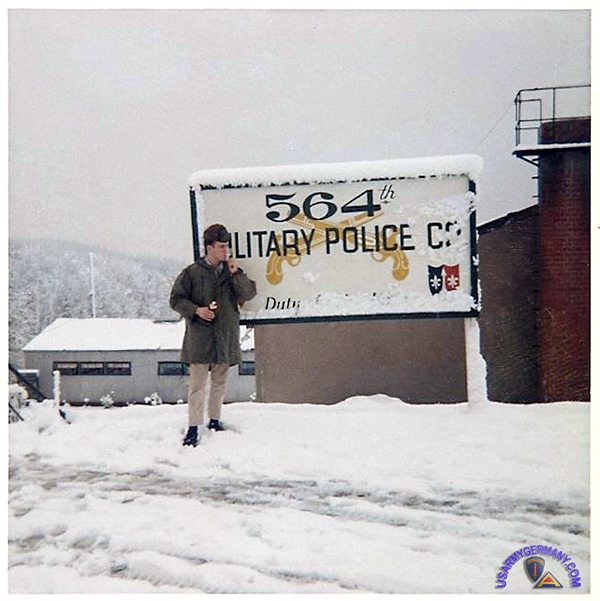 564th MP Company sign at Massweiler Depot, 1966 (John Linden) |
|||||||||||||||||||||||||||||||||||||||||||||||||||||||||||
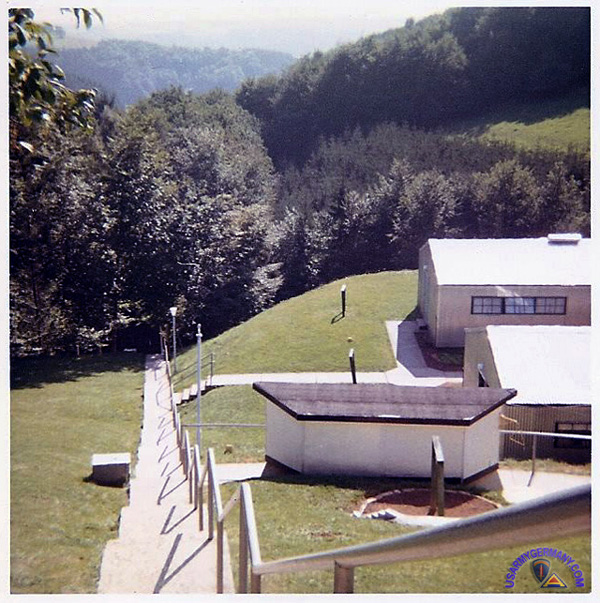 564th MP Company billets at Massweiler Depot, Oct 1966 (John Linden) |
|||||||||||||||||||||||||||||||||||||||||||||||||||||||||||
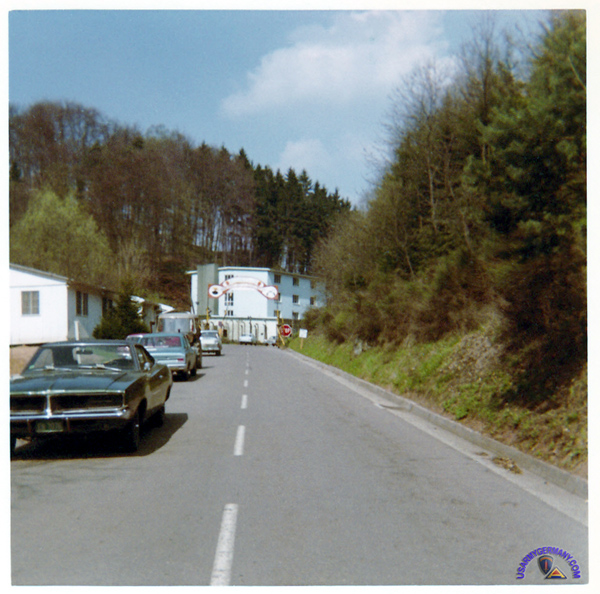 Gate#2 (main gate), Massweiler Depot, 1972 (Robert Allison) |
|||||||||||||||||||||||||||||||||||||||||||||||||||||||||||
| 1971 | |||||||||||||||||||||||||||||||||||||||||||||||||||||||||||
| (Source: Email from Robert James Allison, 564th MP Company, Dec 1971 - 1973) | |||||||||||||||||||||||||||||||||||||||||||||||||||||||||||
| I was an MP stationed at Massweiler in 1972 and 1973. In 1972, the building you show in Photo #4, in the Massweiler section of the Pirmasens Page, was the theater, EM club (with small bar in one rear corner), assembly building for mission briefings and occasional live bands. It was still standing in 2009 when I visited the depot for the first time since I left in 1973. I have attached a couple of other pictures of it from different angles. I have some other photos of other places on the depot, but none from inside as the gates were locked when I visited. If you are interested let me know. I was never a tower rat at the depot since I got to Massweiler just before Christmas of 1971 after a couple of weeks in Pirmasens for indoctrination. From then until September of 1972 I was on the gates and in the caves working security points. The towers were closed down just after I got there and I did not draw any tower duty before they stopped manning them. Occasionally they would pull some of us MPs into Pirmasens for patrol duty or some other special mission. Massweiler was mostly a repair depot at that time and we did sometimes ride in escort Hueys that were guarding Chinooks carrying missiles in and out of the depot to and from parts unknown. |
|||||||||||||||||||||||||||||||||||||||||||||||||||||||||||
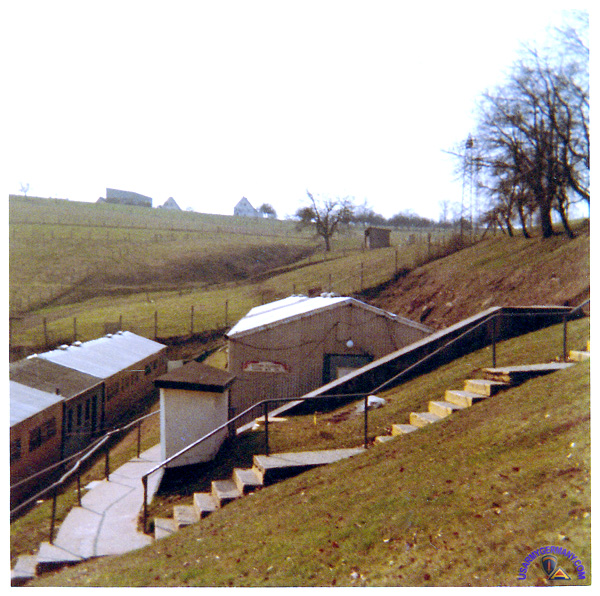 Two of the four MP barracks in 1972 (Robert Allison) |
|||||||||||||||||||||||||||||||||||||||||||||||||||||||||||
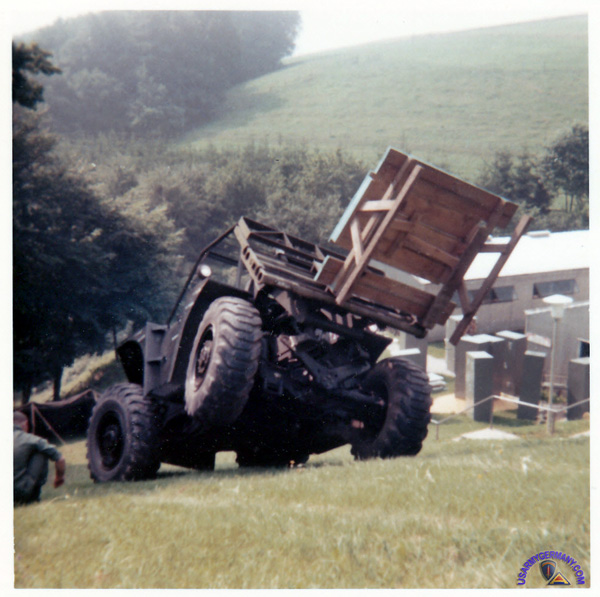 A rough terrain forklift is used to move furniture, wall lockers, etc from the old MP barracks to the 564th's new home in the former Ordnance barracks, 1972 (Robert Allison) |
|||||||||||||||||||||||||||||||||||||||||||||||||||||||||||
| I was on TDY from September 1972 to the middle of December 1972 guarding some air force project in Grunstadt where we lived on the German economy since there was no actual base there, just a secret air force facility on top of a hill. After that I was back at Massweiler just as they were deactivating the depot and relocating the Ordnance unit. We moved from our Quonset huts up on the hill down to the ordnance barracks/mess hall/armory and stayed there until right after Christmas when they broke up the MP unit and scattered us all over Europe. The back gate area was almost always locked and used rarely to bring in heavy equipment, etc. I’m fairly sure that the motor pool is the building in the one photo of the back gate area. We used to know where a hole in the fence was located near that back gate and used it as a short cut to get to town and our favorite Gasthaus. The (facility) engineer building was just below the theater and upper parking lot and above the four MP Quonset huts. The engineer building is where the German resident maintenance workers repaired infrastructure and where the boilers for the MP barracks were located. I’m not sure what the utility building was used for, but I think it was an electrical substation or possibly a telephone switching station. It was not actually part of the depot and used by German utilities. I used to park my VW next to it since it didn’t have a starter and I had to push it down the hill to the parking lot in order to pop the clutch and hope it started…sometimes it didn’t LOL. Anything else I can help you with let me know. One of my books “Scholarly Pursuit” is loosely based on my time as an MP in Germany. I happened to think that I had some old Polaroids of Massweiler. I scanned them in and here they are. Not the best quality, but after all they are 40-year-old Polaroids. These were taken circa 1972. I’m thinking the steps were 267 in number, but then I could be way off there. All I know for sure is there were a lot and if I wanted to eat other that at the EM club I walked them three times a day, until I bought an old beat up VW. |
|||||||||||||||||||||||||||||||||||||||||||||||||||||||||||
|
|||||||||||||||||||||||||||||||||||||||||||||||||||||||||||
|
|||||||||||||||||||||||||||||||||||||||||||||||||||||||||||
|
Related
Links |
|||||||||||||||||||||||||||||||||||||||||||||||||||||||||||
